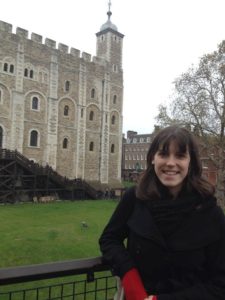Welcome to our new PGR Profile series! Get ready to meet our first PGR – Imogene Dudley.
Name: Imogene Dudley
Discipline: History (third year, full-time)
Location: Practically living in my Queens office, it seems!
What is the working title for your research project?
“Women’s waged work in the south-west of England, 1500 – 1700.” It is very vague and will probably change!
Can you describe your research project in more detail?
I am researching women’s waged work in the south-west of England in the sixteenth and seventeenth centuries. I use household account books from the period to explore what tasks women were paid to do, how much they were paid and in what format, and how the life-cycle and family networks had an impact on women’s working lives. Specific research questions involve the gender division of labour, the gender wage gap and the effect of marriage and childbearing on female employment.
…and can explain it in a single sentence?
I explore the issues relating to women’s work in the early modern south-west counties, such as the gender division of labour, wages and the impact of the life-cycle on female employment.
What is a typical day like for you?
I leave my flat at 8:30am to walk to the Streatham campus, meaning that I am sitting at my desk, eating porridge and answering emails, by 9am. Our office is sociable, and it is a nice working environment. The work I do is mainly related to my PhD and involves data transcription, data analysis and actually trying to write! I will also be writing conference papers, planning teaching or engaging in my responsibilities as History PGR Liaison Rep and co-Editor of Ex Historia (the History PGR journal and seminar series) – the latter two positions involve a lot of emails! I maintain a fairly regular working day, with a half-hour break for lunch with other members of the PGR community in the Queens SCR, and usually head home at about 6pm, to make tea and spend time with my partner and the pet cat.
What would you say is your proudest moment during your research journey so far?
I would say it was definitely receiving the email that told me I had succeeded the interview and was being awarded the studentship and three years funding – either that or passing the upgrade, which was a big step for me.
What do you like to do when you are not researching?
Nothing that out of the ordinary, I’m afraid! I enjoy books and television (mainly historical fiction, fantasy and period dramas). I also like exploring the countryside, visiting new cities and heritage sites, travelling abroad when I can, socialising with my friends (with or without a glass in hand), shopping, meals out, dancing and the occasional cross-stitch project.
If you could start again, what would be your advice to yourself as a new postgraduate researcher?
Have an organised system for note-taking, not only for your project, but also for meetings and training courses. I found having separate notebooks for things really helpful as you always know where notes are – one for any thoughts and notes to do with the PhD, one for supervision meetings, one for training and career development, one for conferences. This is something I wish I had done earlier!
And finally – can you explain your research project in 5 emojis?
- 👩-Woman emoji – the focus of my thesis is on women!
- 💷 -Pound signs emoji – the wage aspect of my thesis.
- 💪- Strong arm emoji – this reminds me of Rosie the Riveter and therefore women working, also labour more generally.
- 👪- Family emoji – this relates to how women (and men!) often gained employment through their family connections, and how marriage and childbearing can affect female employment.
- 📚 -Book emoji – to represent the household account books which are my sources!
Want to learn more about Imogene and her research? You can look at her research profile, or follow her on twitter @imogene_dudley!

